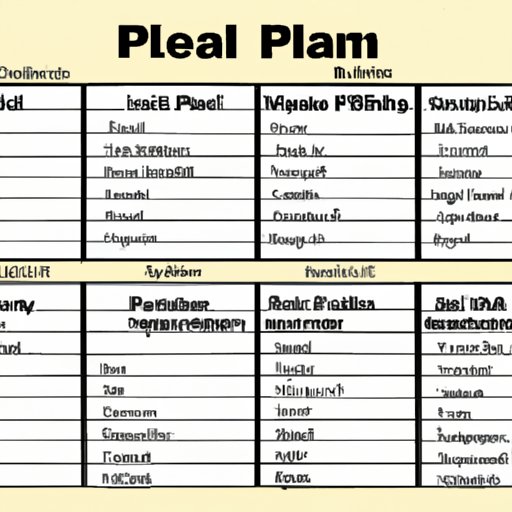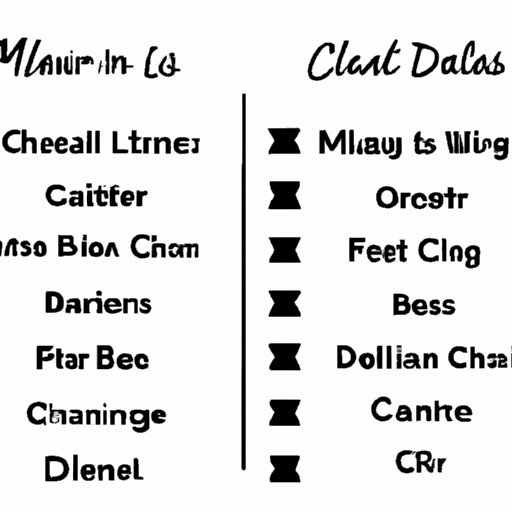Introduction
A cleanse diet is an eating plan that emphasizes whole, unprocessed foods and can be used to detoxify the body or jumpstart a healthier lifestyle. There are many different types of cleanse diets, each with its own set of benefits and potential drawbacks. This article will explore the science behind cleanse diets, provide a sample meal plan, discuss the pros and cons, and offer tips for successfully completing a cleanse.

Exploring the Science Behind Cleanse Diets
Cleanse diets are often associated with detoxification, but there is no scientific evidence to support this claim. However, there is evidence that suggests cleanse diets may have other health benefits. Studies have shown that cleanse diets can reduce inflammation, improve digestion, and help with weight loss. Additionally, cleanse diets can provide important vitamins and minerals that are often lacking in the typical Western diet.
There are also potential drawbacks to cleanse diets. They can be difficult to maintain long-term due to their restrictive nature, and they can also lead to nutrient deficiencies if not done properly. Additionally, some people may experience side effects such as headaches, nausea, and fatigue while on a cleanse diet.
It is important to consult with your doctor before starting a cleanse diet, especially if you have any underlying medical conditions or take any medications. Your doctor can help you determine if a cleanse diet is right for you and provide guidance on how to do it safely.

Sample Meal Plan for a Cleanse Diet
A cleanse diet typically focuses on whole, unprocessed foods such as fruits, vegetables, nuts, seeds, legumes, and whole grains. It is important to choose organic whenever possible and to avoid processed foods, refined sugars, and artificial ingredients. Here is an example of a sample meal plan for a cleanse diet:
Breakfast: Overnight oats with berries and almond butter
Lunch: Quinoa salad with roasted vegetables and avocado
Snack: Smoothie made with banana, spinach, chia seeds, and almond milk
Dinner: Baked salmon with roasted sweet potatoes and steamed vegetables
Snack: Apple slices with nut butter
In addition to eating whole, unprocessed foods, it is important to stay hydrated by drinking plenty of water throughout the day. Herbal teas and bone broths can also be beneficial.
It is also important to avoid certain foods while on a cleanse diet. These include alcohol, sugar, caffeine, processed meats, and fried foods. Additionally, it is best to limit dairy, gluten, and soy during a cleanse.
Finally, it is helpful to plan ahead and prepare meals in advance. This will make it easier to stick to the diet and ensure that you are getting all of the nutrients you need.
Pros and Cons of Cleanse Diets
Like any diet, there are both benefits and drawbacks to cleanse diets. The benefits include improved digestion, reduced inflammation, increased energy, and weight loss. Additionally, cleanse diets can help reset your taste buds and make it easier to transition to a healthier lifestyle.
However, there are also potential drawbacks to cleanse diets. These include nutrient deficiencies, difficulty maintaining the diet long-term, and side effects such as headaches, nausea, and fatigue. Additionally, the restrictive nature of the diet can make it difficult to eat out or socialize with friends.

Tips for Successfully Completing a Cleanse Diet
Successfully completing a cleanse diet requires dedication and commitment. Here are some tips to help you stay on track:
• Set realistic goals. It is important to set achievable goals that are tailored to your individual needs. Make sure to set both short-term and long-term goals so that you can measure your progress.
• Manage cravings. It is normal to experience cravings while on a cleanse diet. To manage these cravings, try to focus on the long-term benefits of the diet and find healthy alternatives to satisfy your cravings.
• Get support. Having a support system can make it easier to stay on track. Connect with others who are doing a cleanse diet or find an online community to provide motivation and accountability.
Conclusion
A cleanse diet is a type of eating plan that can provide a variety of health benefits, including improved digestion, reduced inflammation, and weight loss. However, it is important to understand the potential drawbacks and consult with a doctor before starting a cleanse diet. Additionally, setting goals, managing cravings, and getting support can help make the process easier and more successful.
(Note: Is this article not meeting your expectations? Do you have knowledge or insights to share? Unlock new opportunities and expand your reach by joining our authors team. Click Registration to join us and share your expertise with our readers.)
